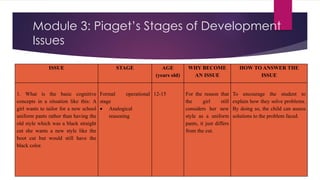Module 3 report Facilitating learning
•
4 gefällt mir•2,038 views
By: Joerigene odette C. Neri
Melden
Teilen
Melden
Teilen

Empfohlen
Empfohlen
Weitere ähnliche Inhalte
Was ist angesagt?
Was ist angesagt? (14)
Cognitive Development of the High School Learners - Psychology 2

Cognitive Development of the High School Learners - Psychology 2
Setting Incredible Expectations - Your Perception of Yourself Defines Who You...

Setting Incredible Expectations - Your Perception of Yourself Defines Who You...
Intellectual development (Piagetian, Psychometric, and Classical Approach)

Intellectual development (Piagetian, Psychometric, and Classical Approach)
Learning and Its relationship with Maturation, Attention and Interest

Learning and Its relationship with Maturation, Attention and Interest
Andere mochten auch
Andere mochten auch (20)
Ähnlich wie Module 3 report Facilitating learning
Ähnlich wie Module 3 report Facilitating learning (20)
Piagets cognitivedevelopmenttheory 123587749173-phpapp01

Piagets cognitivedevelopmenttheory 123587749173-phpapp01
Piagets cognitivedevelopmenttheory 123587749173-phpapp01

Piagets cognitivedevelopmenttheory 123587749173-phpapp01
Mehr von joeri Neri
Mehr von joeri Neri (6)
Kürzlich hochgeladen
APM Welcome
Tuesday 30 April 2024
APM North West Network Conference, Synergies Across Sectors
Presented by:
Professor Adam Boddison OBE, Chief Executive Officer, APM
Conference overview:
https://www.apm.org.uk/community/apm-north-west-branch-conference/
Content description:
APM welcome from CEO
The main conference objective was to promote the Project Management profession with interaction between project practitioners, APM Corporate members, current project management students, academia and all who have an interest in projects.APM Welcome, APM North West Network Conference, Synergies Across Sectors

APM Welcome, APM North West Network Conference, Synergies Across SectorsAssociation for Project Management
Kürzlich hochgeladen (20)
SECOND SEMESTER TOPIC COVERAGE SY 2023-2024 Trends, Networks, and Critical Th...

SECOND SEMESTER TOPIC COVERAGE SY 2023-2024 Trends, Networks, and Critical Th...
Measures of Dispersion and Variability: Range, QD, AD and SD

Measures of Dispersion and Variability: Range, QD, AD and SD
Presentation by Andreas Schleicher Tackling the School Absenteeism Crisis 30 ...

Presentation by Andreas Schleicher Tackling the School Absenteeism Crisis 30 ...
APM Welcome, APM North West Network Conference, Synergies Across Sectors

APM Welcome, APM North West Network Conference, Synergies Across Sectors
Mixin Classes in Odoo 17 How to Extend Models Using Mixin Classes

Mixin Classes in Odoo 17 How to Extend Models Using Mixin Classes
Beyond the EU: DORA and NIS 2 Directive's Global Impact

Beyond the EU: DORA and NIS 2 Directive's Global Impact
Module 3 report Facilitating learning
- 1. Module 3: Piaget’s Stages of Development Issues ISSUE STAGE AGE (years old) WHY BECOME AN ISSUE HOW TO ANSWER THE ISSUE 1. What is the basic cognitive concepts in a situation like this: A girl wants to tailor for a new school uniform pants rather than having the old style which was a black straight cut she wants a new style like the boot cut but would still have the black color. Formal operational stage Analogical reasoning 12-15 For the reason that the girl still considers her new style as a uniform pants, it just differs from the cut. To encourage the student to explain how they solve problems. By doing so, the child can assess solutions to the problem faced.
- 2. Module 3: Piaget’s Stages of Development Issues ISSUE STAGE AGE (years old) WHY BECOME AN ISSUE HOW TO ANSWER THE ISSUE 2.What is the basic cognitive concepts in a situation when a boy used to hear from his mother saying, “Come here baby boy, here is your food.” But the boy suddenly said, “No, it’s ‘getti’ (short for spaghetti) not food.” Pre-operational stage Egocentrism 2-7 For the reason that the child is starting to identify things based on his point of view. To use props or visual aids can be useful to help the identify other objects specifically, or to use cut out images or drawings and/or illustrations and help the child in identifying such objects specifically.
- 3. Module 3: Piaget’s Stages of Development Issues ISSUE STAGE AGE (years old) WHY BECOME AN ISSUE HOW TO ANSWER THE ISSUE 3. What is the basic cognitive concepts in a situation when a teacher in kindergarten uses drawings in the blackboard or draw the object in a blackboard and let the pupils see and touch the original object. Pre-operational stage Symbolic 2-7 To help identify things in the surroundings To use drawings and illustrations, and/or after giving instructions, ask a student to identify the objects as a model for the rest of the class
- 4. Module 3: Piaget’s Stages of Development Issues ISSUE STAGE AGE (years old) WHY BECOME AN ISSUE HOW TO ANSWER THE ISSUE 4. What is Piaget’s stage of cognitive development when a child asks “What if he was not born with his present parents now?” and where he could be? Formal operational stage Hypothetical 12-15 It is an issue because the child is curios if he was born with different parents. Whenever possible, to teach concepts to the child regarding such topics to show concern and understanding, and/or be able to teach and provide the child opportunities to discuss the issue.
- 5. Module 3: Piaget’s Stages of Development Issues ISSUE STAGE AGE (years old) WHY BECOME AN ISSUE HOW TO ANSWER THE ISSUE 5. What is Piaget’s stage of cognitive development when a child incorporates the water in the swimming pool as a drinking water. Pre-operational stage Egocentrism 2-7 The child identifies that all water or fluids are drinking water. To give facts which serve as building blocks for later development for the child and provide opportunities to experience the world to build a foundation for concept of learning. The teacher can engage the child on conversation of the changes which the child is experiencing,
- 6. Module 3: Piaget’s Stages of Development Issues Education 3: Facilitating Learning 11:00 -2:00 pm MEMBERS: Joerigene Odette C. Neri Maria Caress Christine Cabrera Adeline Bacuado Desiree Dahino Michelle Piquero
